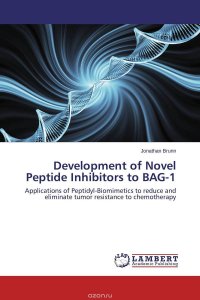One of the most challenging aspects of treating tumors with chemotherapy is that the tumors can develop a resistance to the chemotherapy and survive while the rest of the healthy, non-cancerous cells perish. Higher doses of chemotherapy deliver fewer positive results and at the expense of greater side effects. The purpose of this book is to identify and exploit a weakness at the molecular level of the anti-apoptotic pathway utilized by cancer cells to turn off the "triggered cell death" mechanism of apoptosis and survive chemotherapy. We specifically target the interaction between the anti-apoptotic protein Bcl-2 Associated Athanogene (BAG-1) and the 70-kilodalton Heat Shock Protein (HSP-70) that is suspected of driving the chemotherapeutic resistance, and seek to disrupt that interaction via peptidyl-biomimetically engineered peptides that are predicted via an in-house computational software named "Contact" and experimentally verified via Biacore (c) binding assays. The program "Contact" is now available for free download at http://www.engineering.vcu.edu/proteinengineering/ Это и многое другое вы найдете в книге Development of Novel Peptide Inhibitors to BAG-1 (Jonathan Brunn)
Development of Novel Peptide Inhibitors to BAG-1 Jonathan Brunn
Подробная информация о книге «Development of Novel Peptide Inhibitors to BAG-1 Jonathan Brunn». Сайт не предоставляет возможности читать онлайн или скачать бесплатно книгу «Development of Novel Peptide Inhibitors to BAG-1 Jonathan Brunn»
